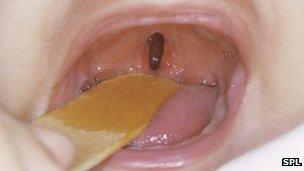Surgeons warn many cleft palate cases missed at birth
- Published
Elizabeth Lewis said: "I dread to think what could have happened"
Too many babies born with a cleft palate are being diagnosed late, causing unnecessary distress, the Royal College of Surgeons says.
Figures for England, Wales and Northern Ireland showed more than a quarter of cases were not picked up within the required 24 hours after birth.
Health campaigners say the problem can affect crucial early days of bonding.
A cleft palate is a gap in the roof of the mouth leading to difficulties sucking adequately and trouble feeding.
The condition can also lead to hearing and speech difficulties, and may indicate other problems with the heart or nervous system.
Unlike a cleft lip, a cleft in the palate is hard to identify in a scan during pregnancy. National guidelines say the problem, which affects about 500 babies every year in the UK, should be diagnosed within 24 hours of birth.
This allows quick referral to a team of experts including surgeons, nurses, orthodontists and speech and language therapists.
But figures published by the Royal College of Surgeons show a cleft palate is often missed at birth.

A cleft palate can cause problems feeding for babies
They come from the Crane Database, which is a national register of information on those born with a cleft lip or palate in England, Wales and Northern Ireland.
The Crane annual report says last year 28% of babies with a cleft palate alone did not get a diagnosis within 24 hours. And 5% of cases had not been picked up after a month.
Anxiety and distress
The clinical lead of the database, Scott Deacon, says there is a need for stronger guidelines.
He says in the past health staff have been trained to use a finger to feel for the defect, but he insists that a thorough visual check is needed.
"What we're asking for is for people to visibly examine the mouth using a torch and a spatula to get the tongue out of the way. Because obviously a baby is small and it's not the easiest thing to see unless you're getting the tongue depressed and out of the way."
Mr Deacon says a failure to diagnose the problem can cause parents great anxiety and distress.
That was the experience of Elizabeth Lewis 16 months ago following the birth of her son Tomas. He struggled to feed and lost weight, but it took four days until his cleft palate was identified.
"I just wasn't able to feed him and give him that important nourishment that he needed. And that is very hard. You start blaming yourself, thinking I must be doing something wrong, there's something wrong with my child.
"It's awful and I wouldn't wish it on anybody," she said.
Tomas has had corrective surgery on the cleft, but will require further checks on his speech and hearing.
Rosanna Preston from the Cleft Lip and Palate Association backed the call for better early diagnosis: "For any parent, noticing that your baby is not eating, feeding properly or gaining weight is terribly worrying.
"Many parents will initially blame themselves until the cause is found and worries about their baby's health can affect those crucial early days of bonding; the sooner they can get support the better."
A spokesman for the Department of Health said newborn babies deserved nothing less than the best possible care.
"We expect that NHS organisations will want to follow NICE [National Institute for Health and Clinical Excellence] guidelines on postnatal care, so that mothers and new babies receive the vital support they need."
- Published9 April 2012
- Published28 March 2012